Maybe you’re considering relocating to Scandinavia, or maybe you’re just curious about how life in Sweden really is. Either way, there is a lot of misinformation about Swedish life floating around the web, so I’d like to tell you what life here is actually like.
This is from my perspective as a native Swede who grew up here, decided to go live, travel, study, and work abroad for eight years (seven years in the US and one in Australia), and finally moved back to Sweden to start a family here.
A Swede with some perspective and a skeptic mind, one might call me.
Straight off the bat, I’d like to also say that this will not be another one of those articles blindly praising the “perfect Nordic lifestyle” that they’ve read about in a book full of cool illustrations and buzz words.
Because like in any other place, there are without any doubt both good and bad things about living in Sweden, something that should be obvious to anyone who has read or seen a Nordic Noir story (usually telling melancholic tales from the lesser-known side of Nordic culture).
To this end, I’ve made every effort to keep this article as unbiased and balanced as possible, to be as helpful as possible for you. Instead of only relying on my own experiences, I’ve also asked my expat friends who have actually made the move to Sweden about their opinion (good or bad). I also verify any claim with as much scientific rigor as possible, referring to scientific papers, studies, and polls whenever possible.
With that in mind, I hope this guide to life in Sweden will come to use for you and help you build a more accurate and balanced view of what life in Sweden is actually like.
- Life in Sweden: Pros & Cons Summary
- Pros: 26 Reasons Why Sweden Is a Good Place To Live
- Pro #1: Livable Salaries in Most Professions
- Pro #2: Clean Air & Clean Water
- Pro #3: Free/Low-cost Education Incl. University
- Pro #4: Long Parental Leave
- Pro #5: Low CO2 Emissions & Clean Energy
- Pro #6: Many Healthcare Workers Per Capita
- Pro #7: Proximity to Water in Most Places
- Pro #8: Independence From Fossil Fuel Exports
- Pro #8: Healthy Work-Life Balance
- Pro #10: Very Little Religious Influence in Swedish Politics
- Pro #11: A Cool Climate With Warm Summers
- Pro #12: Many Unique Career Opportunities
- Pro #13: Family-Friendly Culture
- Pro #14: Reasonable Institutions & Easy Bureaucracy
- Pro #15: A Culture of Transparency
- Pro #16: Very LGBTQ-Friendly
- Pro #17: High Level of Gender Equality
- Pro #18: True Wilderness Available For All
- Pro #19: Very Sparsely Populated
- Pro #20: Close to Continental Europe & Most of the Nordics
- Pro #21: Low Level of Public Debt
- Pro #22: High Fertility Rate
- Pro #23: Low Levels of Corruption
- Pro #24: Good & Affordable Public Transportation
- Pro #25: High-Quality Housing
- Pro #26: Science, Research & Knowledge Leads the Way
- Cons: 19 Bad Things About Living in Sweden
- Con #1: It Can Get Very Cold
- Con #2: The Long & Dark Winters
- Con #3: Hard to Make Friends with Swedes as an Adult
- Con #4: Swedes Aren’t Very Spontaneous
- Con #5: Lower Levels of Customer Service
- Con #6: Segregation Can Be Real in Sweden
- Con #7: Many Unwritten Swedish Social Rules
- Con #8: Swedish Youth Don’t Always Respect the Elderly
- Con #9: Healthcare Wait Lines Can Be Brutal if You’re Unlucky
- Con #10: Flat Organizations Can Be Cumbersome
- Con #11: Expensive Consumer Products (i.e. Alcohol, Tobacco & Meat)
- Con #12: Conformity Rules: Swedes Dislike Outliers & Prefer Staying in One’s Lane
- Con #13: Swedes Can Be Very Complacent & Take Things For Granted
- Con #14: Swedes Often Like to Feel Morally Superior to Others
- Con #15: Swedes Can Often Come across as Stingy & Selfish
- Con #16: Swedes Can Act Very Entitled, Especially at Work
- Con #17: Suppressed Racism is Common in Smaller Towns
- Con #18: Swedes Like Reciprocation of Favors More than Genuine Acts of Kindness
- Con #19: Swedes Straying Outside the Norm Often Face Some Form of Discrimination
- Quality of Life: How Life in Sweden Compares Globally
- What Do Actual Expats and Visitors Think of Sweden?
- Is Sweden a Safe Place To Live?
Life in Sweden: Pros & Cons Summary
Note: What is a Pro for me might be a Con for you, and vice versa. This list is based on what the vast majority of people I’ve talked to believe are good vs. bad things about living in Sweden. Some points may be listed in both columns as they can be both good and bad depending on your personality and beliefs.
- Livable Salaries in Most Professions
- Clean Air & Clean Water
- Free/Low-cost Education Incl. University
- Long Parental Leave
- Low CO2 Emissions & Clean Energy
- Many Healthcare Workers Per Capita
- Proximity to Water in Most Places
- Independence From Fossil Fuel Exports
- Healthy Work-Life Balance
- Very Little Religious Influence in Swedish Politics
- Cool Climate & Warm Summer
- Many Unique Career Opportunities
- Family-Friendly Culture
- Reasonable Institutions & Easy Bureaucracy
- A Culture of Transparency
- Very LGBTQ-Friendly
- High Level of Gender Equality
- True Wilderness Available For All
- Very Sparsely Populated
- Close to Continental Europe & Most of the Nordics
- Low Level of Public Debt
- High Fertility Rate
- Low Levels of Corruption
- Good & Affordable Public Transportation
- High-Quality Housing
- Science, Research & Knowledge Leads the Way
- It Can Get Very Cold
- The Long & Dark Winters
- Hard to Make Friends with Swedes as an Adult
- Swede’s Aren’t Very Spontaneous
- Lower Levels of Customer Service
- Segregation Can Be Real in Sweden
- Many Unwritten Swedish Social Rules
- Swedish Youth Don’t Always Respect the Elderly
- Healthcare Wait Lines Can Be Brutal if You’re Unlucky
- Flat Organizations Can Be Cumbersome
- Expensive Consumer Products (i.e. Alcohol, Tobacco & Meat)
- Conformity Rules: Swedes Dislike Outliers & Prefer Staying in One’s Lane
- Swedes Can Be Very Complacent & Take Things For Granted
- Swedes Often Like to Feel Morally Superior to Others
- Swedes Can Often Come across as Stingy & Selfish
- Swedes Can Act Very Entitled, Especially at Work
- Suppressed Racism is Common in Smaller Towns
- Swedes Are Inclined Toward Reciprocation of Favors Rather than Genuine Acts of Kindness
- Swedes Straying Outside the Swedish Physical & Cultural Norms Often Experience Discrimination
In my case, when I decided to move back to Sweden I felt like the pros heavily outweighed the cons, and this is something I still feel to this day. But I also didn’t know about or consider a lot of the other factors in both the pro and con columns,
Pros: 26 Reasons Why Sweden Is a Good Place To Live
Pro #1: Livable Salaries in Most Professions
The income gap is much smaller in Sweden compared to the US and UK, meaning you are more likely to be able to live a good life on a standard working-class wage.
Income inequality by country (1st = most unequal, 172nd = most equal)
The Gini Index ranks 172 countries by income inequality. Source: World Bank 2021
Pro #2: Clean Air & Clean Water
Even in the bigger Swedish cities, you’ll notice the air feels clean and the tap water tastes great (bottled water quality according to many of the expats). Sweden is proud of its clean air and water and takes great care in keeping it that way, with more policies intended to protect the environment than most other EU members.
World Air Quality Report Ranking
Non-sovereign states excluded. Source: Greenpeace / IQAir 2021
And a quick comparison with the US specifically:
- Sweden has 12% higher air quality on average than the US
- The US has 59% more air pollution than Sweden per capita
Pro #3: Free/Low-cost Education Incl. University
EU / EEA / Swiss citizens with a permanent residency permit in Sweden can attend University free of charge, and Swedes will even get paid every month in the form of a combined study grant and low-interest loan totaling 2732 SEK / 316 USD (in 2021).
US citizens pay on average 129 000 SEK / 14 900 USD per academic year (as per 2021), with scholarships available to apply for to lower this amount.
Pro #4: Long Parental Leave
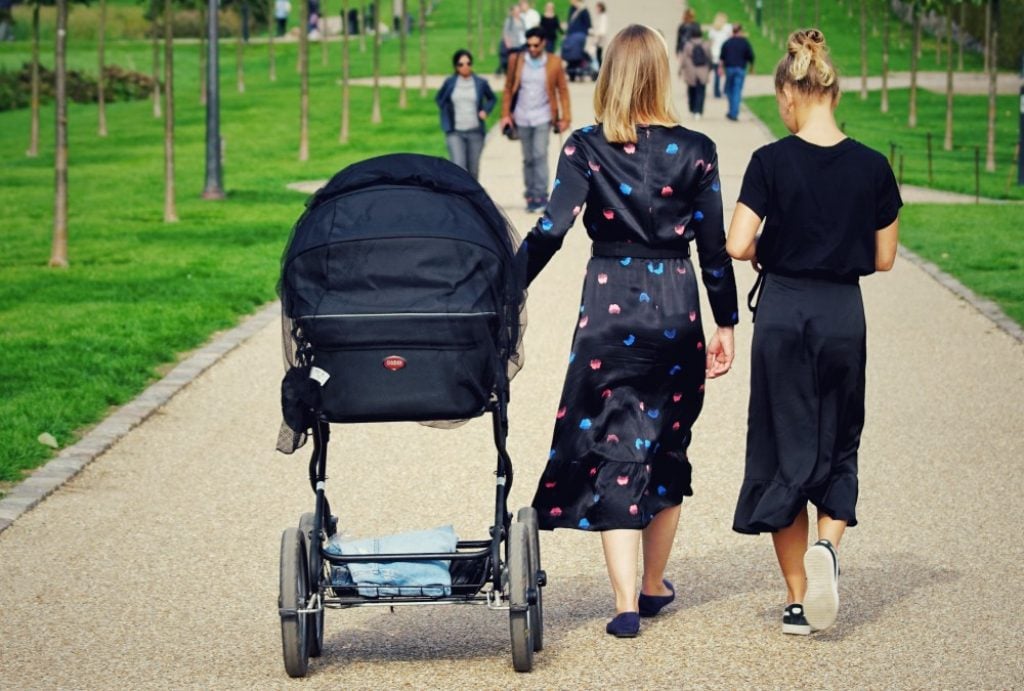
Parents in Sweden get to share a pool of 480 days (approx. 16 months) of paid parental leave between them, with 90 of them reserved for each parent (meaning the other parent can’t utilize them).
The reserved days contribute to a more evenly distributed parental leave between the mother and father.
Pro #5: Low CO2 Emissions & Clean Energy
Sweden ranks 4th out of 149 countries for the category Planet & Climate in The Good Country Index, and has undertaken numerous efforts to become carbon neutral (meaning net zero emission of greenhouse gases) by 2045.
Here’s how Sweden compares to the US as far as carbon footprint goes:
- The US releases four times more CO2 per capita than Sweden
- Americans have a 62% larger ecological footprint than Swedes
Pro #6: Many Healthcare Workers Per Capita
In 2019 Sweden had almost twice the number of practicing physicians per 1000 people (5.5) compared to both the US (3) and UK (3), and more nurses and midwives as well (12 in Sweden, 9 in the US, 8 in the UK).
What difference does this make in the end you might ask? Let’s take a look at healthcare data from the US in comparison:
- Sweden has a higher quality of health care than the US (76%)
- Sweden has a higher life expectancy at birth than the US
- Sweden has less than half the infant mortality rate of the US (2.45 vs 5.22 est. in 2021)
- Sweden has a quarter of the US maternal mortality rate
Pro #7: Proximity to Water in Most Places

In most places in Sweden a water source will likely be within a short distance; with coasts, lakes, rivers, or one of the thousands of smaller creeks and bogs spread out across the country. This mean loads of fun activities centered around the water in the summer, which truly heals the body and soul for a Scandinavian.
Pro #8: Independence From Fossil Fuel Exports
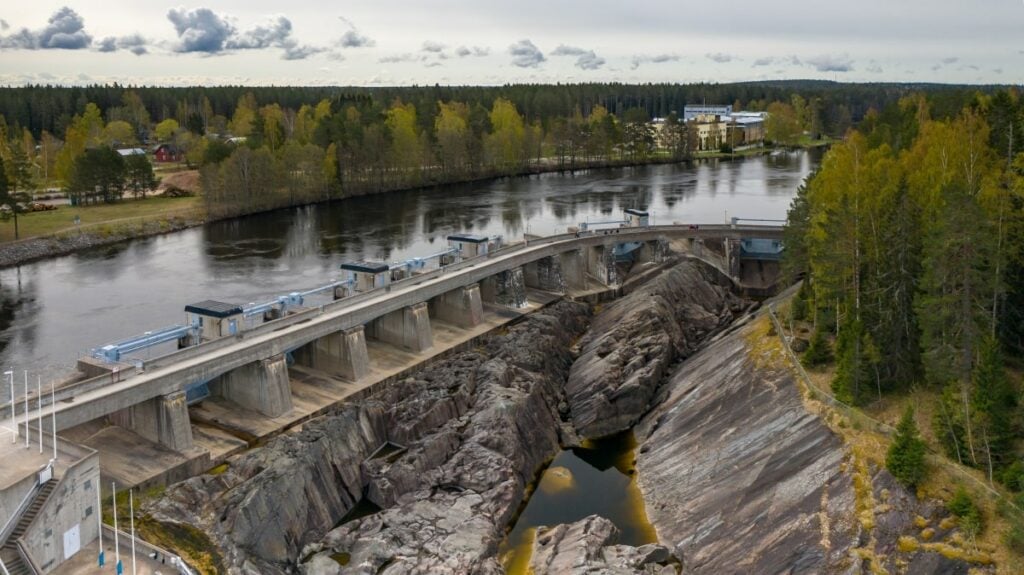
Sweden does not depend on exporting fossil fuels at all, and actually lives up to its green reputation and ambition for the most part, unlike other European countries who blast out green PR but depend heavily on oil exports in the end (Netherlands, Norway).
Pro #8: Healthy Work-Life Balance
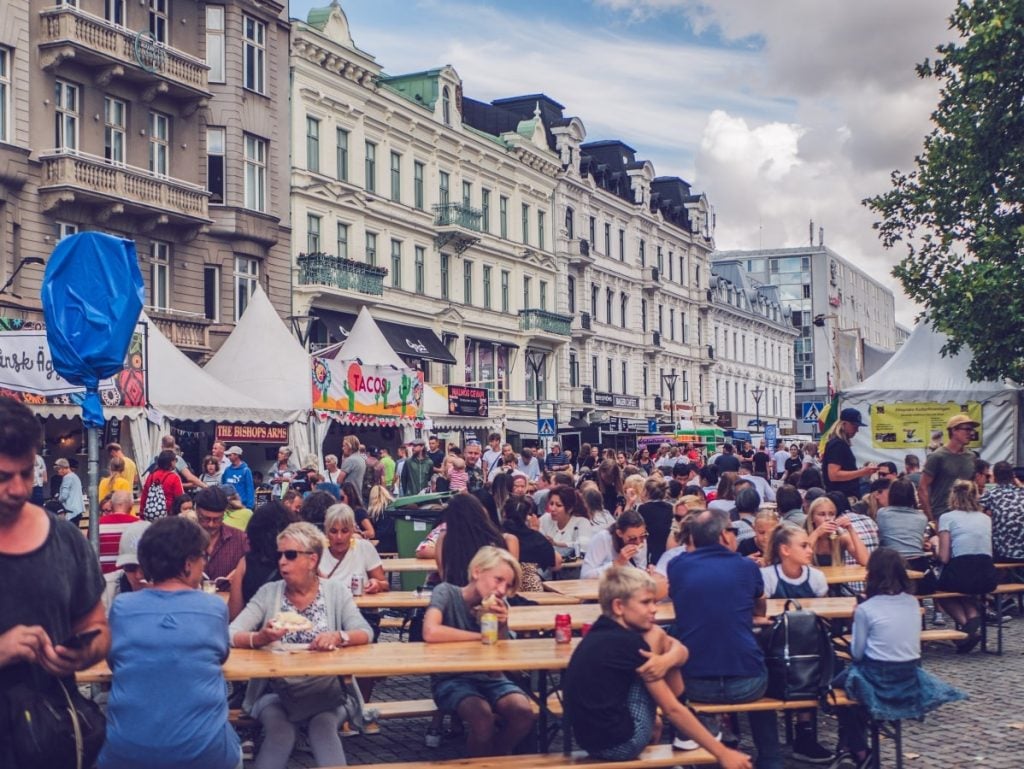
Working in Sweden generally enables a healthy work/life balance, and you can even prioritize your personal life goals in many ways while pursuing a successful professional career in many industries that are otherwise extremely competitive internationally speaking.
Pro #10: Very Little Religious Influence in Swedish Politics
Religion does not play much of a role in Swedish politics or even in media as a whole, which is a breath of fresh air for many that are coming from a climate that is more polarized and puts a stronger focus on religious beliefs instead of scientific studies when new policies are created.
Only 18% of Swedes claim to believe in a God, compared to 37% of Brits and 88% of Americans (according to recent Gallup polls).
% of people who believe in a god
Source: Gallup 2022
Pro #11: A Cool Climate With Warm Summers
People generally look at us Scandinavians with pity when they realize how cold it gets here in the winter, but others actually enjoy the cool Nordic climate.
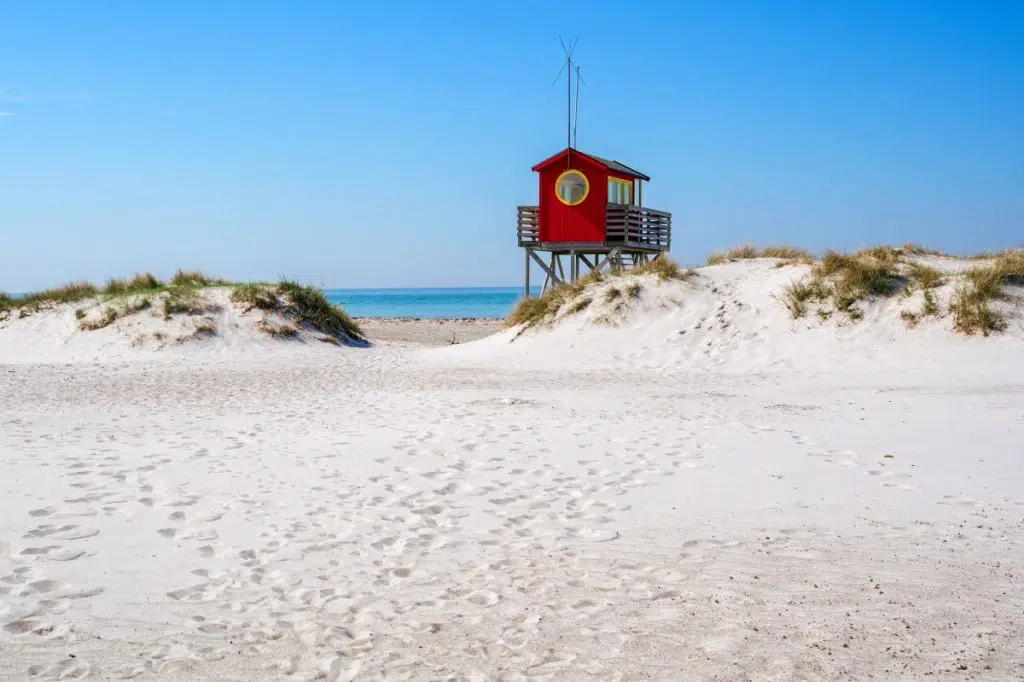
And despite a generally cool climate, you can enjoy a nice and warm-ish summer wherever in Sweden you are, with summer average max temperatures hovering around 23 °C (73 °F) in July, coupled with endless summer days due to the proximity to the polar circle.
Pro #12: Many Unique Career Opportunities
Sweden has many high-tech and bio-chem hubs around the country, with especially Lund, Karlskoga, and Stockholm offering a wealth of interesting career opportunities, many aimed towards international employees.

Sweden is also home to Spotify, H&M, IKEA, Ericsson, Bofors, Volvo (to name a few), and there is a huge demand for skilled workers across the board right now.
Pro #13: Family-Friendly Culture
It seems easier to have kids and to care for your offspring in Sweden, across the board: From a guaranteed Pre-school spot from 2 years and up for a very low fee, to no school fees from kidnergarten and up (other than for after school care if needed).
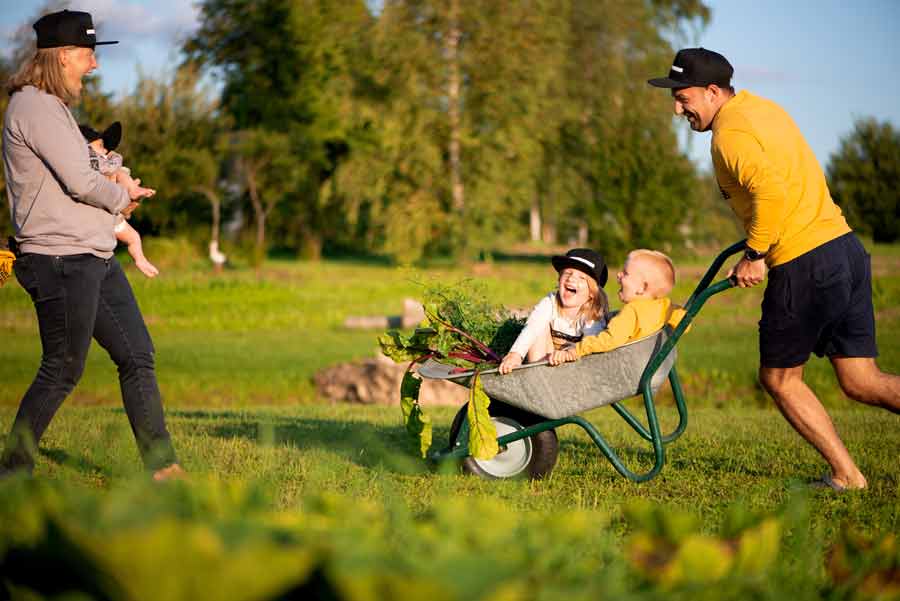
Pro #14: Reasonable Institutions & Easy Bureaucracy
Bureaucracy is according to most of the Swedes I hang out with (mostly) perceived as reasonable and fairly easy to navigate, and more than once have I been guided helpfully and patiently through things like parental leave and getting paid while caring for a sick child (as in a cold, tummy ache, or whatever) or applying for a new passport.
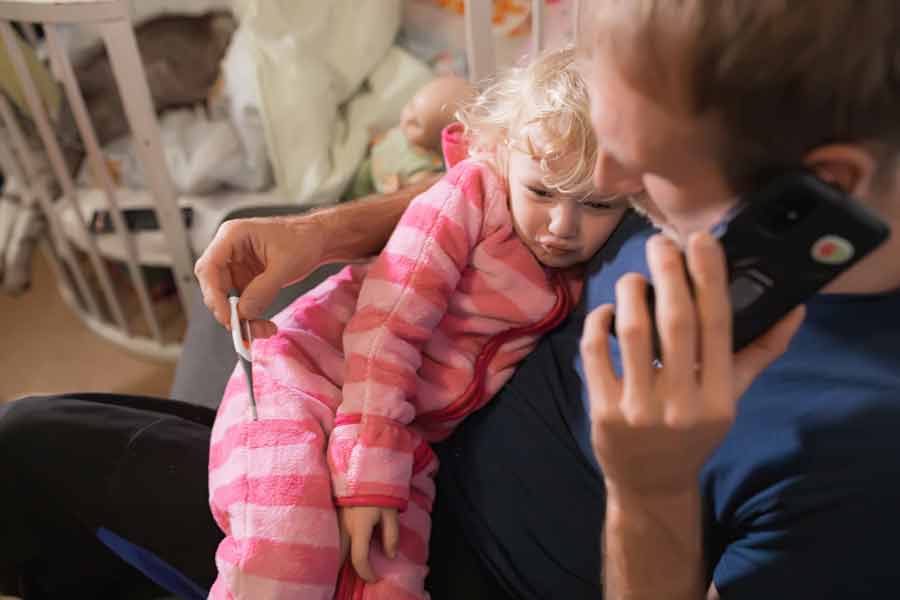
If you’d like a more specific example of how quick and easy bureaucracy in Sweden can be, I’ll explain how it works when one of your kids gets sick (and you are a parent who normally works but now has to stay home with the kid):
- Notify your kid’s school that the kid is sick (takes 1 minute via an app or website)
- Notify the social insurance agency that you need to care for a sick kid (takes 1 minute via an app or website)
- After a few minutes you get a confirmation that confirms that you will receive sick pay for the specified days toward the end of the following month
Especially during times when viruses run rampant through the population (such as during the pandemic or just any given February in Sweden when the whole country seems to catch some sort of bug) this is a great benefit for both people (don’t have to work or go to school sick) and society (which benefits from a slower and more distributed spread of the viruses).
Pro #15: A Culture of Transparency
All information regarding public operations (including tax data) is considered public information in Sweden, which breeds a culture of transparency in Swedish governance (and society as a whole).
This also includes information that most people around the world would consider secret such as company earnings statements as well as people’s salary and credit history.
Pro #16: Very LGBTQ-Friendly

Sweden ranks 5th in the world in the Spartacus Gay Index (which scientifically measures and ranks how gay-friendly countries around the world are yearly since 2012).
Pro #17: High Level of Gender Equality
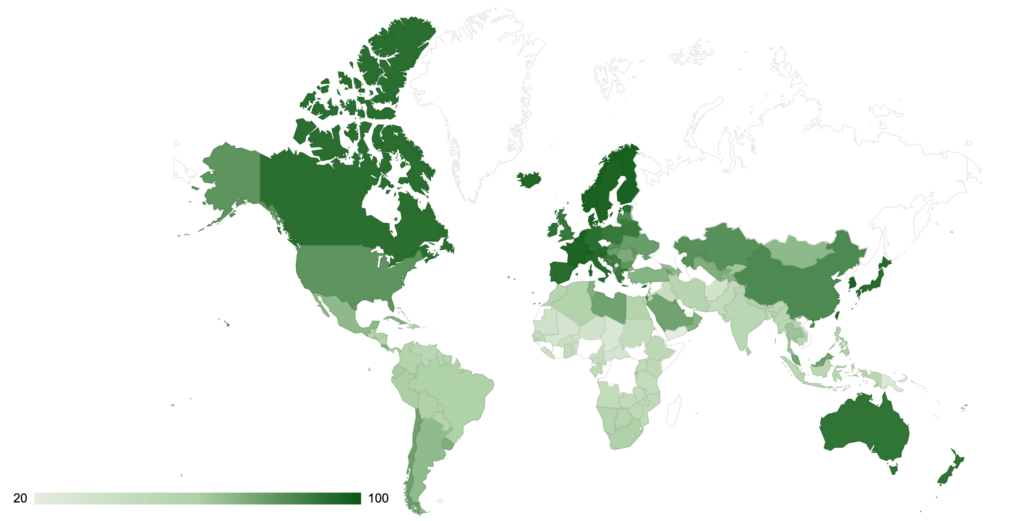
Gender equality is an important part of the public conversation in Sweden (GII = 95.5), especially compared to the US (79.6) and to a certain extent the UK (89.1).
Pro #18: True Wilderness Available For All
Sweden is 70% covered by forest, a forest that every year attracts tens of thousands of tourists from all over Europe (especially Germany) where this type of forest used to be present, but is nowadays rare due to deforestation.

A unique aspect about Swedish nature is what we call allemansrätten (“all man’s right”), the right for anyone to move through, camp, pick berries, and paddle a canoe almost everywhere.
Pro #19: Very Sparsely Populated
There are huge areas that are very sparsely populated in Sweden, especially in the north (Norrland). And with 69% of the country covered in forest, over 90 000 lakes, and 3 000 kilometers (1 800 miles) of coastlines, there are plenty of remote spots where one can take in nature in its full glory undisturbed.
Even the bigger cities do not feel very crowded, despite offering many of the amenities and comforts of big cities in general.
Pro #20: Close to Continental Europe & Most of the Nordics
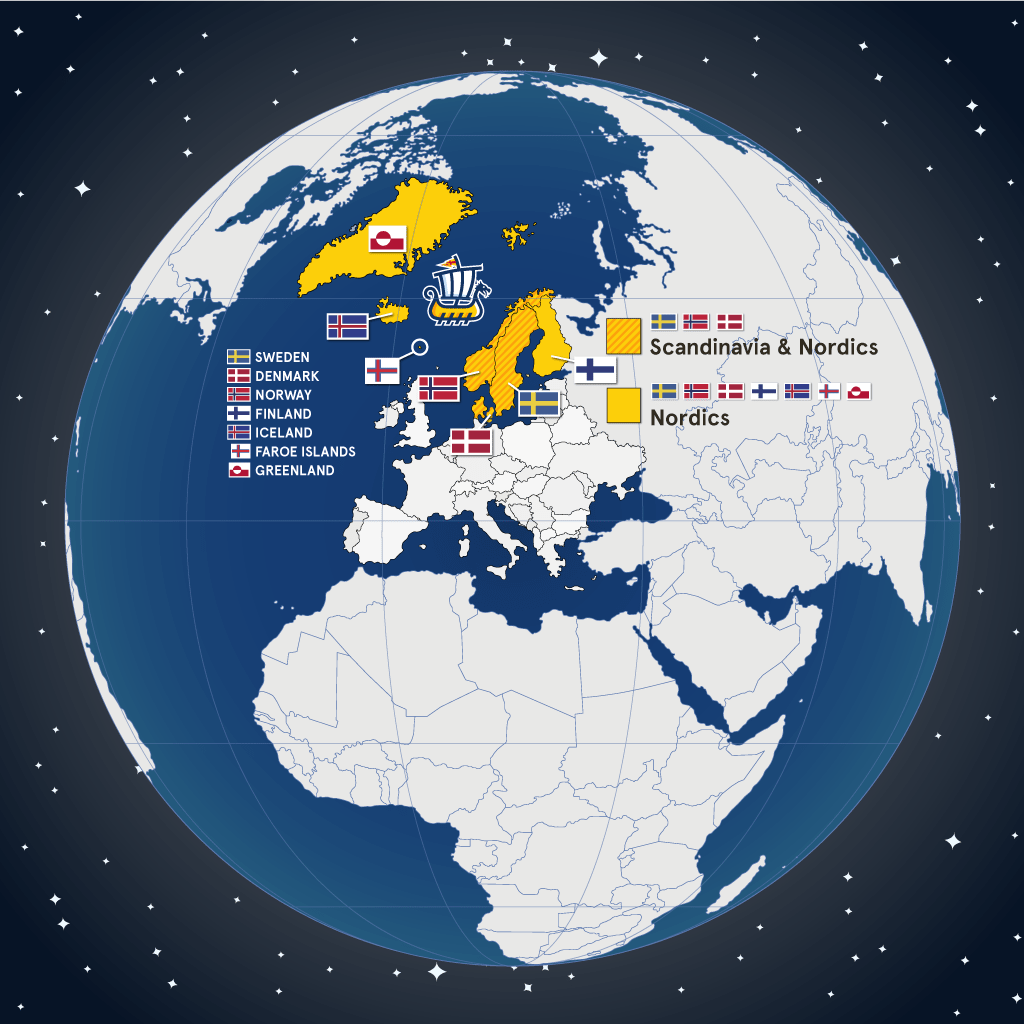
Sweden is the largest Nordic country and is uniquely located in-between the other three large Nordic countries (Denmark, Norway and Finland) and continental Europe. This provides easy access to most countries in Northern, Central, and Western Europe (something all Nordic countries can’t claim).
Pro #21: Low Level of Public Debt
Many people would prefer to live in a nation that doesn’t rely on huge levels of public debt, and while the US owes 70% of its GDP in public debt, that number is 38.2% of GDP in Sweden.
This is not really something that affects your day-to-day life, but still something many US expats noted as a big plus.
Pro #22: High Fertility Rate
Sweden has had among the highest fertility rates in Europe for a while, with a Total Fertility Rate of 1.76 children per woman in 2018, compared to 1.64 in the US and the European average of 1.55.
A higher fertility rate combined with a developed and functioning economy means a brighter future for society as a whole, and less risk for an abnormally big part of the population being retired and unable to work, while depending on a smaller workforce to take care of them.
Pro #23: Low Levels of Corruption
No country is perfect, but Sweden comes pretty close to being completely free of corruption, ranking 3rd in the world in the Corruption Perceptions Index (higher means less corrupt).
This, coupled with the high level of transparency in Swedish economics and politics, means that you likely will never encounter a situation in which you need to “grease some wheels” in order to get something done, or feel like someone else is getting unfair advantages.
Pro #24: Good & Affordable Public Transportation
From Stockholm’s metro and Gothenburg’s famous trams to country-side buses that reach even the most remote of places; In Sweden it’s considered a human right to have access to affordable public transportation.
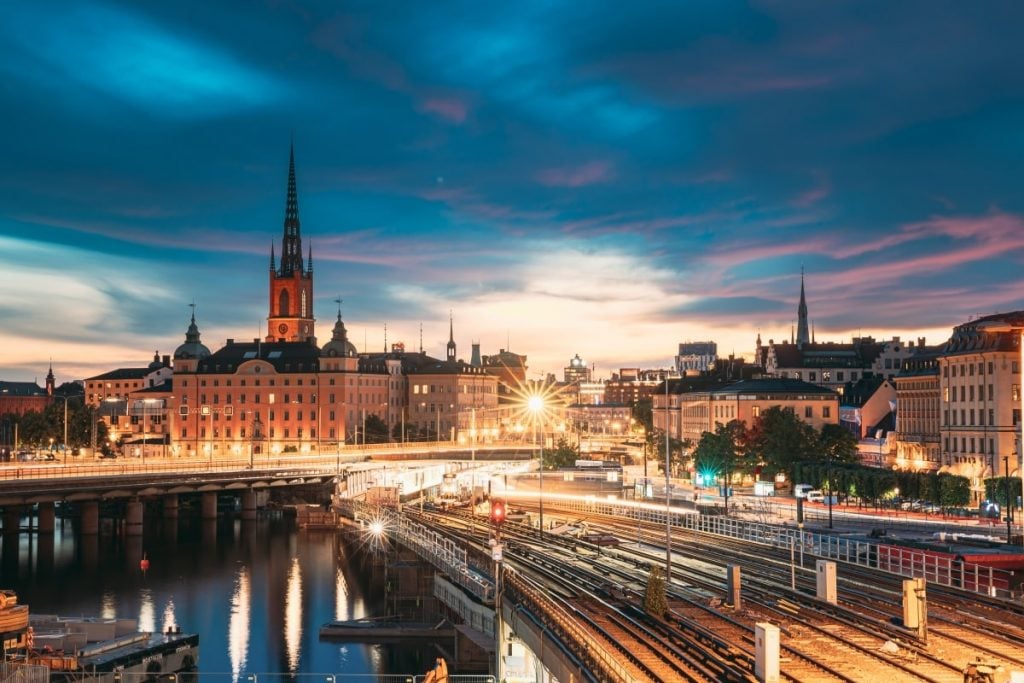
For the bigger cities, this means fewer cars, less noise pollution, and much cleaner air in general, which we can see in the European Commissions Quality of Life survey that ranks Malmö (the third most populous city in Sweden) as the second most quiet city out of 83 major European cities.
Pro #25: High-Quality Housing
Houses in Sweden are (mostly) built to last, and at least need to be able to handle the harsh Swedish winter. This means proper insulation, sturdy and multi-layered windows, high-quality pipes that won’t get damaged, etc.
Pro #26: Science, Research & Knowledge Leads the Way
In most aspects of society, Sweden follows “the science” (as opposed to public opinion) and generally trusts the work and research of scientists from the many top-tier universities above political and business interests.
We can see this in how many scientific articles are published in Sweden, ranking 5th globally in the number of published scientific papers per capita (for 2018), placing it just below Switzerland, Denmark, Norway, and Australia.
Cons: 19 Bad Things About Living in Sweden
Here are a few negative examples that expats in Sweden have encountered in their Swedish life (this is not to say that everyone has). Some of them might be more commonly seen than others, and they are by no means struggles and characteristics you will see in every single Swede.
But still, after talking to loads of people about what they don’t particularly enjoy with life in Sweden, these are the most common things they complained about.
Con #1: It Can Get Very Cold
Sweden sees winter temperatures ranging from 0 °C (32 °F) in the south to -15 °C (5 °F) in the north, with snow covering the country for up to 200 days of the year in the north (Norrland), down to around 60 days of the year in the south (Götaland). You up for that? Didn’t think so…
Con #2: The Long & Dark Winters

Winter in Sweden can last from October to April for certain years, even in the south from time to time (we had one of those winters down in Skåne in 2019).
And when winter near the polar circle means up to 24 hours of darkness, it’s no wonder Swedes tend to get depressed around the colder half of the year.
Con #3: Hard to Make Friends with Swedes as an Adult
In an expat survey by Mercer in 2020, Sweden scores comparably low in categories such as “ease of settling in”, “feeling at home”, “friendliness”, and “finding friends”. So it’s clear that newcomers to the country struggle more than usual with forging friendships.
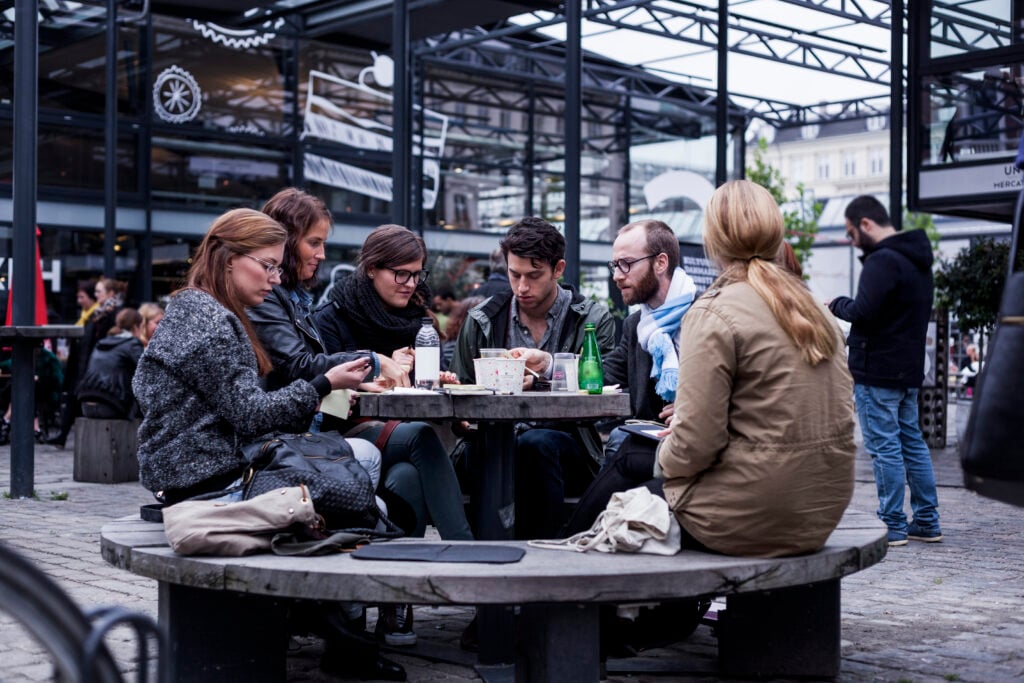
Why is this then? A reason that I’ve noticed myself and heard, again and again, is that Swedes tend to build a solid group of lifelong friends in their youth/young adulthood, leaving little reason to invest the time in making new close friends once this group has been cemented.
Con #4: Swedes Aren’t Very Spontaneous
You are expected to make advance plans with people in Sweden before anything as simple as having a cup of coffee, not to mention things like dinner and casual meetups between friends.

This can lead to experiencing a lack of spontaneous dinner parties and adventures that is way more common in other cultures.
Con #5: Lower Levels of Customer Service
Don’t get me wrong, customer-facing staff in Sweden are nice enough and usually do a good job, but they tend to not to be as service-minded as in the US for example. Perhaps this comes as a result of higher job security, wait staff getting paid a decent wage without depending on tips, and more employee rights in general.
Whatever the reason, people usually notice a more stand-off approach among service staff in Sweden, which can take some getting used to.
Con #6: Segregation Can Be Real in Sweden
Many densely populated outskirt areas of the bigger cities have been increasingly segregated from Swedish society since the 1970s. This is primarily due to failed integration policies from both the local and national Swedish governments, and a naive belief that things will sort themselves out in the long run.
Here’s a sobering (albeit a tad alarmist) look at the effect of the Swedish immigration policies and the resulting segregation:
Note that the above video only highlights some pretty negative trends and aspects of Swedish society, without much focus on positive trends or aspect. Still, it does a good job showcasing some of the issues Sweden is facing with regards to segregation.
Because growing up in the same city can sometimes feel like different worlds depending on which neighborhood you come from, with large parts of immigrant populations in these areas struggling to learn the Swedish language, getting Swedish jobs, or seeing any good reason to join Swedish society as a whole.
Con #7: Many Unwritten Swedish Social Rules
It can sometimes be hard to keep up with all the unwritten social norms present in Swedish society, like the need to constantly reciprocate favors, always splitting tabs, always saying thank you for every single thing — the list goes on.
Swedes usually learn this gradually over a lifetime, but for newcomers, it can be overwhelming with so many little things to remember all at once in order not to step on anyone’s toes.
23 Unwritten Rules According to a Swede (What NOT To Do in Sweden)
No one wants to be the person who comes to a new country and pisses everyone off by breaking a bunch of unwritten rules you didn’t know about. If you’re wondering what things you should avoid doing when in Sweden, here’s your best friend. Because there are a lot of no-nos in Sweden, some more serious than others, that might not exist at all or to a different degree in your home country.
Con #8: Swedish Youth Don’t Always Respect the Elderly
Well this one might not be unique to Sweden, but perhaps a symptom of a changing culture on a global level? Either way, there is a growing tendency among the youth of today not to show the same appreciation and respect towards the older generation, as perhaps other cultures see more of (especially around the Mediterranean).
Maybe it’s the gloomy climate outlook or the fast-moving pace of technological innovation? Either way, the gap between the old and the young seems to grow wider.
Con #9: Healthcare Wait Lines Can Be Brutal if You’re Unlucky
If your health issues fall within what’s considered normal; colds, coughs, back pain, etc. — you’ll likely have an ok time navigating the Swedish healthcare system. But if you stray away from the norm, you might be in for some long-ass waiting times.
To illustrate this, the Swedish Association of Local Authorities and Regions (Sveriges Kommuner och Regioner) reports that 31% of those in need of specialized healthcare (also called Tertiary care) waited for 90 days or more for their first visit with a specialist in Febraury 2024.
And according to the same report, after the intitial visit with a specialist, 39% of Swedish patients waited for at least an additional 90 days until they received any treatment.
I can only echo these statistics from my own recent experiences with specialized healthcare in Sweden, after having suffered a herniated disc in April 2022 that wasn’t properly diagnosed until August in the same year, after which I did not get surgery until February 2023.
All is good now though, but the process could’ve been resolved a lot quicker and cost both me and Swedish society a lot less!
And even though I’m certainly glad healthcare in Sweden is free (my surgery would’ve cost many years of income if it wasn’t for Swedish universal healthcare), waiting too long no doubt carries a perceived cost for both the patient and the society which needs to pay the patient’s sick pay while waiting for a resolution.
Con #10: Flat Organizations Can Be Cumbersome
In workplace settings, Swedes have been observed to be generally more team-oriented with a tendency to include as many as possible in the decision-making process.
This can be great in certain settings, and very challenging in others (especially if you’re coming from a more authoritative work culture like the US).
Con #11: Expensive Consumer Products (i.e. Alcohol, Tobacco & Meat)
Sweden has adopted a policy of high taxation on consumer products that can have a negative effect on public health, which means that stuff like cigarettes and booze carry a higher tax than other products, making them quite expensive compared to neighboring European countries.
Tobacco Tax in Sweden
(Total Cost of 20-Pack Cigarettes: €5.30)
Source: Skatteverket
Con #12: Conformity Rules: Swedes Dislike Outliers & Prefer Staying in One’s Lane
The Law of Jante, or Jantelagen, is a widespread social attitude in Sweden (and Scandinavia as a whole) that essentially means to not stand out or think you are anything special, or stronger than we, the collective.
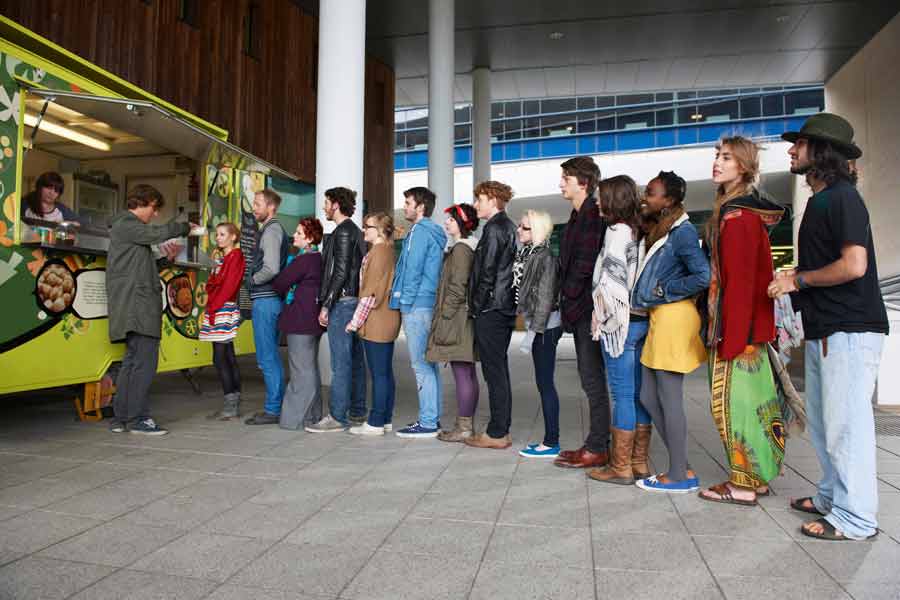
This focus on conformity over standing out has certainly influenced Swedish society as a whole, The exception to this view is when it comes to athletic and competitive environments in general, because Swedes love to compete and stand out in a good way, they just don’t think there are any good reasons for their neighbors to show off their flashy new car for everyone to see.
Con #13: Swedes Can Be Very Complacent & Take Things For Granted
It can sometimes feel like the cultural structures Sweden is built on train people to become complacent to a certain degree. Content with life, too—of course— but Swedes are definitely complacent when it comes to not questioning and instead blindly accepting political decisions and leadership.
It’s the way it’s always been it seems, and a big reason why the Nordic “middle way” model has been able to work so well in Sweden no doubt. The “Nordic Model” is built on mutual trust between citizens and government, where individuals generally feel like they can trust their leaders to do what’s best for them (which is definitely not the case everywhere in this world).
The world is changing and the Swedish political climate is too, so now more than ever we could probably use a healthy dose of skepticism to keep our politicians on their toes, morally speaking.
Con #14: Swedes Often Like to Feel Morally Superior to Others
If you know a Swede you are very likely to catch them up on a high horse at some point in your friendship. Swedes love to take the moral high ground, up to a ridiculous degree sometimes.
Fanatically focusing on moralism has even stifled scientific voices that usually weigh so heavy in Sweden. As an example, black-and-white moralism has been standing in the way of helping Swedish addicts for a long time; as the world around Sweden is gradually changing its view on narcotics and how to offer care for its abusers, Sweden still wages a war on drugs reminiscent of the 1980s in the US.
Con #15: Swedes Can Often Come across as Stingy & Selfish
Going out with Swedish workmates for the first time can be an eye-opener, as Swedes insist on splitting every possible bill evenly, and acts of generosity seem few and far between.
There is also no real tipping culture in Sweden (or elsewhere in the Nordics) either, so it’s easy to assume that everyone is stingy by nature.
This is likely due to cultural differences more than a general selfish trait in reality, as Swedes generally dislike waste, displays of wealth, and other actions that would make them stand out from the crowd.
Con #16: Swedes Can Act Very Entitled, Especially at Work
When I was working as a farmhand in Queensland, Australia, one of the farmers I met had nothing but good things to say about Scandinavians and our work ethic. I thanked him for the compliment, but thought to myself straight away; “do Scandinavians actually have good work ethics generally speaking?”.
In some ways, sure. Swedes like to put their head down and get some work done without stirring the pot. But Swedes, and Scandinavians in general, can also be very entitled workers, as employers usually need very good reasons to be able to fire anyone.
Boss asking you to fill in for a sick workmate? “You can’t force me to, and you can’t fire me for not doing it. So no thank you.” While this can feel like a breath of fresh air for an American coming from sometimes oppressive work environments, it can also go too far in the other direction (and it often does in Sweden).
Con #17: Suppressed Racism is Common in Smaller Towns
Despite the Vikings being a very multicultural bunch, Swedes have still been a fairly homogenous people for a long time. This means most Swedes have generally looked similar and acted in a similar fashion, which has come with a tendency to mistrust anything straying outside of this well-established norm.
Swedish cities are usually very multicultural and open-minded when it comes to people looking and acting different from the “typical Swede”, but out in the countryside, this is not always the case.
In the countryside, the far-right Sweden Democrats tend to attract loads of votes from rural citizens afraid that their cozy lives are being threatened by people acting and looking different from them, and as a result, many forms of racism can be on full display. Sound familiar? Yeah. It’s a pretty common human condition it seems.
Con #18: Swedes Like Reciprocation of Favors More than Genuine Acts of Kindness
You’ll often notice that if you do a favor for a Swede, they will try to reciprocate this favor as fast as humanly possible. And this isn’t necessarily a bad thing, as those of you who have lent your friends money without ever getting them back can attest to.
But, it tends to erase the possibility to perform genuine acts of kindness without any need to reciprocate, and this can be a bit annoying and weird for many cultures.

Swedes can’t stand the thought of being indebted to someone in any way, and do not like to be seen as “in need of helping” at all, so they will much rather balance the scales right away to avoid having to worry about any social ramifications.
Con #19: Swedes Straying Outside the Norm Often Face Some Form of Discrimination
I’ve lived through examples of this throughout my life, being a person who generally tends to go against the grain (a big no-no in Sweden) and who likes to do un-Swedish things like get into spontaneous discussions with complete strangers (Swedes in general detest that). I’m usually met with a confused face and nothing but obstacles, when other cultures might go with the flow and enjoy a breath of fresh air in their daily routine.
And it doesn’t have to be straying outside normal behavior that gets you in trouble, sometimes it’s enough that you look or seem different to feel a certain sense of discrimination. As an example, many expats and travelers can attest to nightclubs in Stockholm tending to let parties of “ethnic Swedes” in from the line outside, before welcoming more diverse parties.
Quality of Life: How Life in Sweden Compares Globally
To get a scientific and balanced sense of how good or bad life in Sweden really is from a global perspective, we can look at how Sweden ranks as a destination for expats and visitors based on WorldData’s massive dataset relating to quality of life (among others).
| Data Points | Sweden 🇸🇪 |
|---|---|
| Stability Political & economic stability – WorldData 2020 | 100% |
| Rights Legal system, civil rights & freedom of expression – WorldData 2020 | 100% |
| Health Life expectancy, water cleanliness, health services – WorldData 2020 | 87% |
| Safety Crime/homocide rate, displaced persons – WorldData 2020 | 96% |
| Climate Assuming optimal climate is 25 C / 77 F and 55% humidity – WorldData 2020 | 18% |
| Relative cost Cost of living, ease of doing business – WorldData 2020 | 18% |
| Popularity Happiness, migration rate, number of tourists – WorldData 2020 | 39% |
| Score Weighted score out of 100%, higher is better (adjusted for relevant factors such as size, quality, etc.) | 65% |
Some of the factors previously mentioned as pros or cons are visible in this dataset, for example:
- It Can Get Very Cold: Sweden scored 18/100 in the “Climate” category mainly due to the low average temperature and precipitation.
- Expensive Consumer Products (i.e. Alcohol, Tobacco & Meat): Sweden scored 18/100 in the “Relative Cost” category mainly due to the high cost of consumer products.
All in all, Sweden places 48th out of 91 countries in this WorldData Quality of Life dataset aimed towards visitors and expats alike.
The country does score in the top of every sub-category except for climate, cost, and travel popularity. Considering the sometimes harsh climate and higher travel costs commonly associated with the Nordic countries, the lower scores in these areas did not come as a big surprise.
Here’s how the OECD compares Swedish and US quality of life:
| Quality of Life Topic | 🇸🇪 Sweden | 🇺🇸 United States |
|---|---|---|
| Housing (housing conditions & spending) | 6.9 | 8.5 |
| Income (household income & financial wealth) | 4.6 | 9.0 |
| Jobs (earnings, job security, unemployment) | 8.1 | 8.4 |
| Community (quality of social support network) | 6.7 | 6.3 |
| Education (education quality and what you get out of it) | 7.7 | 7.0 |
| Environment (quality of environment) | 9.1 | 6.8 |
| Civic engagement (citizens’ involvement in democracy) | 6.8 | 7.0 |
| Health (citizens’ health) | 8.5 | 8.9 |
| Life Satisfaction (citizen happiness) | 8.9 | 7.4 |
| Safety (crime rates and feeling safe) | 8.5 | 7.5 |
| Work-life balance (balance of work and play in life) | 8.4 | 6.0 |
| Total Quality of Life Score | 7.65 | 7.53 |
What Do Actual Expats and Visitors Think of Sweden?
In figuring out how life in Sweden is I wanted to ask the people who have actually moved to Sweden what they think. Here we will also look at larger surveys of how actual visitors of the country rate Sweden in different areas related to quality of life.
I looked at three independent surveys asking expats and visitors what their experience in Sweden was, and this is the result:
| Data Points | Sweden 🇸🇪 |
|---|---|
| Quality of living: Surveying employees working abroad 23rd out of 231 cities – Mercer 2019 | 23rd |
| Quality of life: Surveying actual expats Out of 60 countries – Expat Insider 2019 | 29th |
| Quality of life: Surveying website users Out of 83 countries – Numbeo User Survey 2020 | 13th |
| Weighted Score Weighted score out of 100%, higher is better (adjusted for relevant factors such as size, quality, etc.) | 68% |
Although the three surveys might be different in nature, they seem to all tell similarly lukewarm tales about life in Sweden for foreigners.
While Sweden places very high in Mercer’s quality of living index for employees working abroad and in Numbeo’s user survey for visitors, we start seeing some interesting trends in Expat Insider’s survey where Sweden places somewhere in the middle compared to the other countries surveyed, which ultimately brings down the overall score in this category.
In the Mercer survey Sweden scores very low in ease of settling in, feeling at home, friendliness, and finding friends; so it looks like we can see a hint of even more negative factors here that we have previously listed cons, for example:
- Hard to Make Friends with Swedes as an Adult
- Lower Levels of Customer Service
- Segregation is Real in Sweden
- Many Unwritten Swedish Social Rules
- Conformity Rules: Swedes Dislike Outliers & Prefer Staying in One’s Lane
- Swedes Can Often Come across as Stingy & Selfish
- Swedes Are Inclined Toward Reciprocation of Favors Rather than Genuine Acts of Kindness
- Swedes Straying Outside the Swedish Physical & Cultural Norms Often Experience Discrimination
Is Sweden a Safe Place To Live?
- Most places in Sweden are extremely safe to live, especially compared to the majority of places in the US and UK
- Some areas in the outskirts of bigger cities have become stomping grounds for gang violence due to systemic segragation of immigrants since the 70s. These areas can be unsafe for visitors, but the vast majority of residents would likely never describe them as unsafe to live in.
- Sweden has a higher share of its population experiencing crime, violence or vandalism in their living area compared to the EU average, “beating” countries like Germany and Denmark.
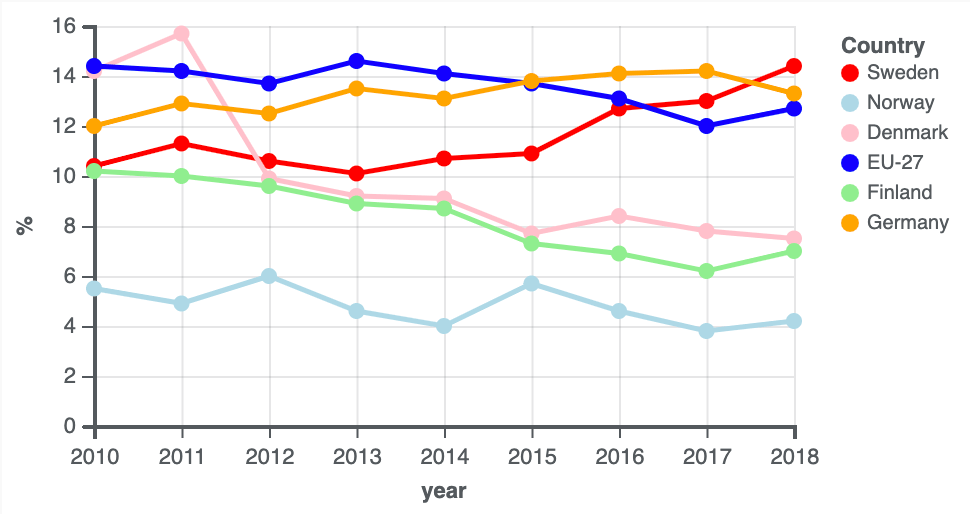
So Sweden’s crime rate is comparably high in Europe, but Europe sees a comparably low rate of crime compared to the US. Here is how crime rates in Sweden differ from the US specifically:
- US has a higher murder rate than Sweden
- US has a 28% higher crime rate than Sweden
- US has 3 times higher gun crime rate than Sweden
- US has 5 times higher homicide rate than Sweden
- Sweden has twice the rape rate of the US
Still, you might have heard US politicians on either end of the aisle go on about how Sweden is this or that, specifically when it comes to policies they either support or fear like the plague. Either way, they most likely cherry-pick some isolated statistics about the country that happen to fit their political motives perfectly. Not exactly the most trustworthy sources, in other words.
By the way, if you'd like to connect to your inner Scandinavian with some stylish prints and clothing, I've created a collection of high-quality and authentic Nordic posters and apparel.
Sources:
https://index.goodcountry.org/
https://data.worldbank.org/indicator/SI.POV.GINI?name_desc=false
https://studyinsweden.se/plan-your-studies/fees-costs
https://data.worldbank.org/indicator/SH.MED.PHYS.ZS
https://data.worldbank.org/indicator/SH.MED.NUMW.P3
https://news.gallup.com/poll/142727/religiosity-highest-world-poorest-nations.aspx
https://www.un.org/development/desa/dpad/wp-content/uploads/sites/45/WESP2021_ANNEX.pdf
https://www.transparency.org/en/cpi/2020
https://www.internations.org/go/moving-to-sweden
https://si.se/app/uploads/2021/04/arsrapport-2020.pdf
http://www.diva-portal.org/smash/get/diva2:948146/FULLTEXT01.pdf
https://bra.se/statistik/statistiska-undersokningar/nationella-trygghetsundersokningen.html
https://www.worldvaluessurvey.org/
https://www.statista.com/statistics/532459/sweden-population-2015-by-level-of-education/
https://www.businessinsider.com/50-maps-that-explain-how-america-lives-spends-and-believes-2019-6
https://www.ipsos.com/sites/default/files/2017-05/DN_Ipsos_Svenska_Varderingar%2020160830.pdf
https://www.oecdbetterlifeindex.org/countries/sweden/
https://www.oecdbetterlifeindex.org/countries/united-states/
https://www.numbeo.com/cost-of-living/country_result.jsp?country=Sweden
Show more sources + Traveling to Sweden: What To Expect (Costs, Data, Attractions)
Traveling to Sweden: What To Expect (Costs, Data, Attractions) English in Sweden: How Well Swedes Speak & Understand English
English in Sweden: How Well Swedes Speak & Understand English How Sweden Compares To the US (Complete Guide)
How Sweden Compares To the US (Complete Guide) Traveling to Norway: What To Expect (Costs, Data, Attractions)
Traveling to Norway: What To Expect (Costs, Data, Attractions)

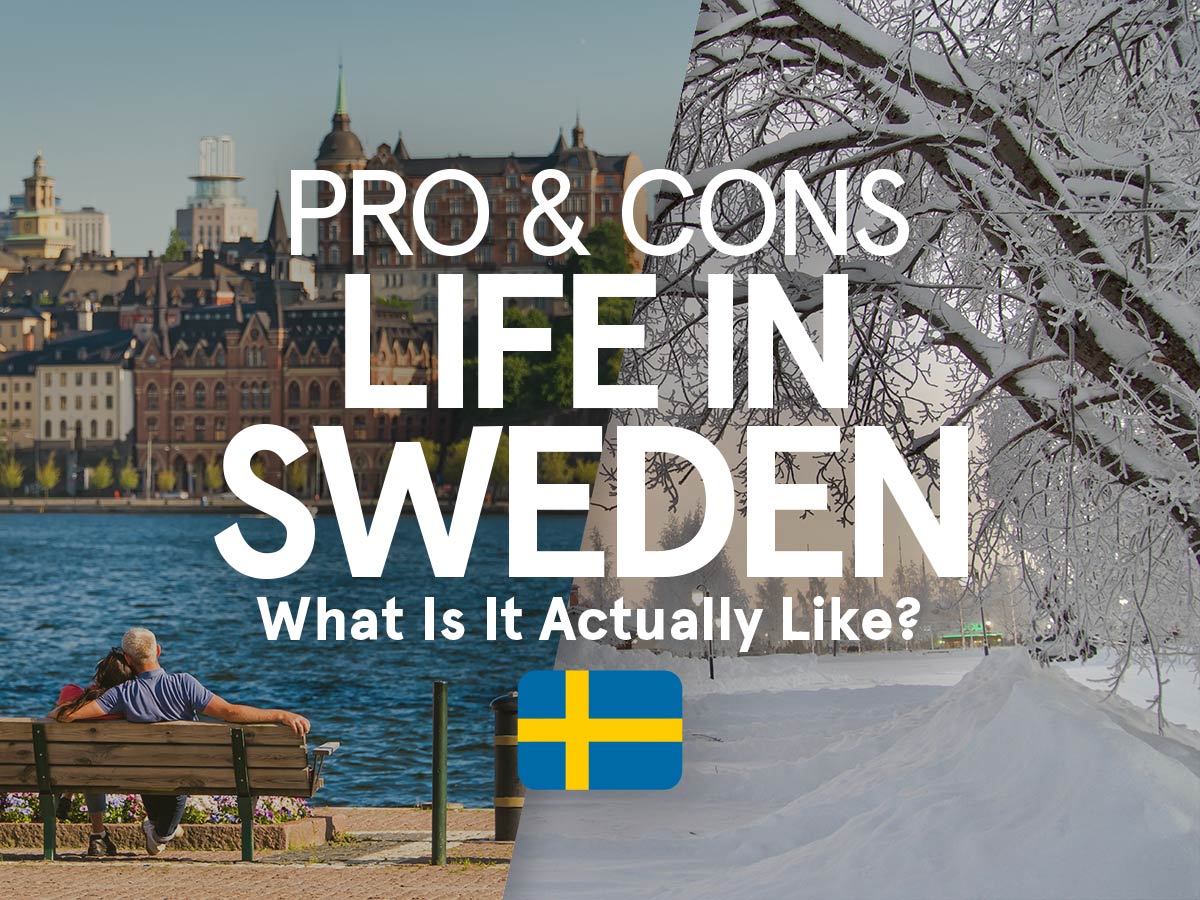


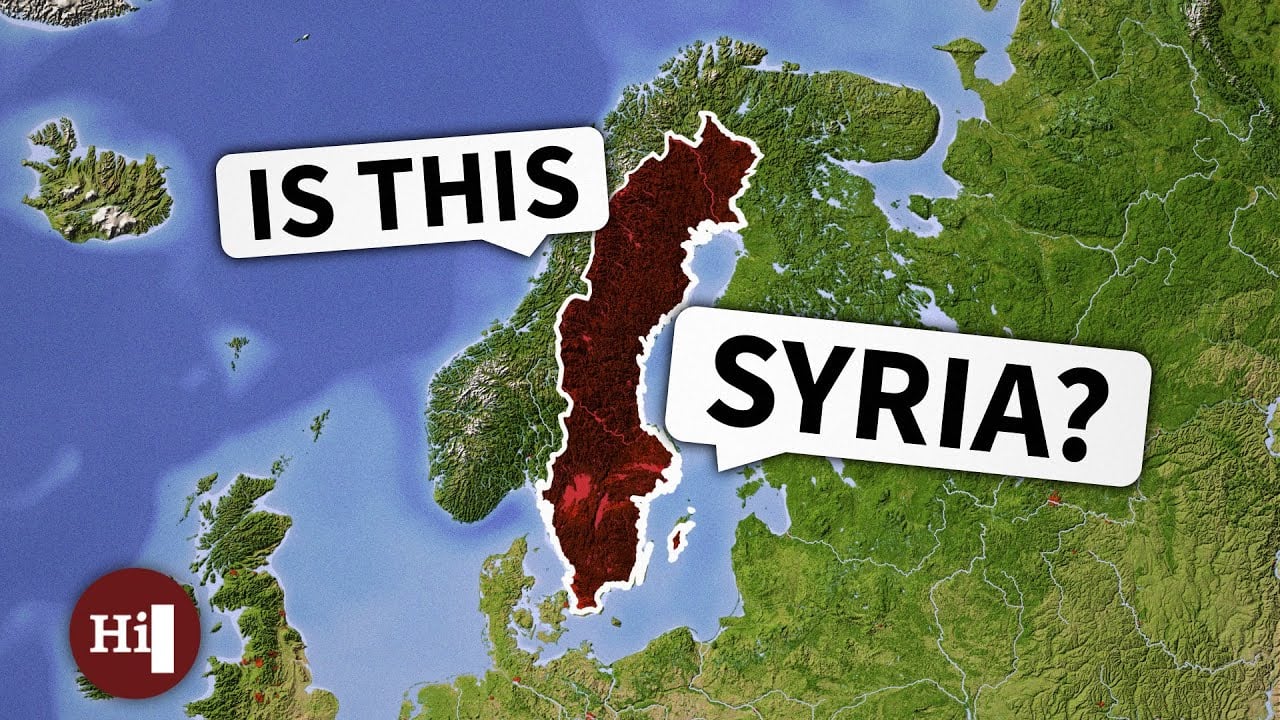
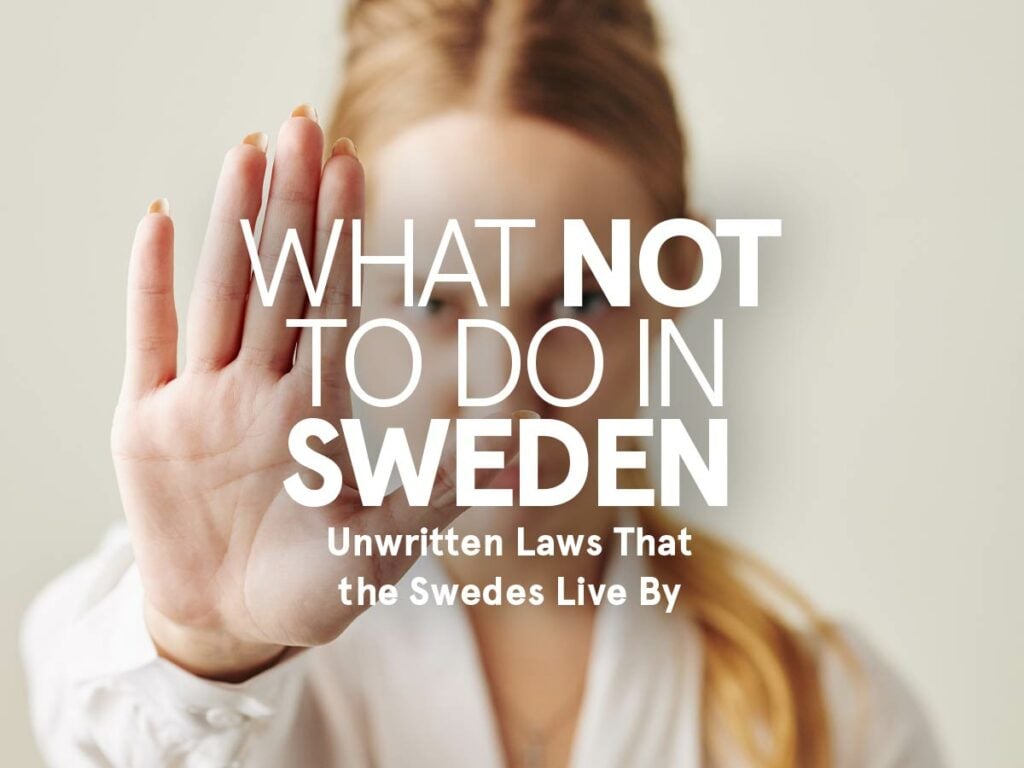

Thank you for all this useful information. I wasn’t considering visiting Sweden until I read this article. Now I believe I will have to. I do have Swedish blood anyway, but no clear relatives there.
I am currently doing research for a fictional character that might live in Sweden or Norway. I’m very interested in certain details that would be apparent in the everyday life of a blue-collar worker and family. If possible I would like to correspond with any Swede willing to answer a few questions.
Thanks again
Thanks for reading James!
A descent source for some insight into the daily life of a Swede (or Scandinavians in general) would be TV dramas such as “Tunna Blå Linjen”, “Bron”, “Vår tid är nu”, etc. I can especially recommend “Tunna Blå Linjen” which gives you a fairly accurate description of the daily life of a police officer in Malmö, Sweden. I’ve written about my favorite Nordic TV series here if that helps: https://nordicperspective.com/culture/nordic-noir-scandinavian-tv-series
Feel free to reach out via https://nordicperspective.com/contact if you have any specific questions!
Karl. It would be great to chat as I have lived abroad for 10 years in Australia and I am scared to death about moving back to Sweden and it also feels very exciting to get closer to all of Europe again. The weather is my biggest worry and leaving a place I think is almost perfect, Sydney
Hey Magnus! Having lived in Sydney (as well as California), I can definitely relate to your worries about the stark difference in weather. I absolutely loved the warmer climate, and thought to myself: how could I ever go back to Sweden?
The thing is, after a year in Australia where I basically had summer weather the entire year (I went to Queensland in the winter), I started missing the seasonality of Sweden a bit. And after 7 years in sunny California, I actually started to long for the dark and cold winters, and the foggy and moody autumns.
There is something about the cyclical nature of the Swedish climate that I have learned to love over the past decade since moving back. When the weather and sunlight are constantly changing over the course of the year, you learn to appreciate each season for the unique qualities they offer. Walking outside in a forest in the winter is pure magic, with the cold and crisp air, the crunchy snow beneith your feet, the unique smell of everything frozen in time around you, and the blissful silence you’ll only experience in the winter. Likewise, walking through a park in the fall can be truly transformational with the colorful trees and mystical fogs.
And when spring comes along and everything starts coming to life around you, humans included, you can’t help but feel hopeful, and the winter and fall becomes part of this experience. Finally, the bliss of Swedish summer just wouldn’t be the same if you didn’t have the other seasons behind you to contrast it. The country comes alive and squeezes every single drop out of the warm and bright summer, celebrating every single day of sunshine because we all know it’ll eventually come to an end.
To me, it feels more balanced with the Swedish seasons compared to the Australian or Californian. I appreciate the hot and sunny summer much more because I have just lived through the cold and dork winter, just like fall and winter feels like a welcome change of pace when they arrive.
It’s all personal in the end, but if you’ve already decided to move back to Sweden I’m certain you’ll find ways to appreciate what you once dreaded and fled from, now that you have a fresh perspective.
Best of luck!
Karl
Really beautifully written Karl. I’m British and enduring the (seemingly) never ending Swedish vårvinter this year. Your post gave me some perspective on why I like the summers here so much.
Oh and your typo – I too feel like a dork in winter!
Excellent article. Best I have read so far on trying to understand Sweden before visiting. I like all the pros (and secretly some of the cons!) of your description of Swedish society. I am an Australian looking for a part time European summer home (a change from Spain) and had never considered Sweden, but am now looking forward to dipping my toe in the water for a month or so next Summer. Do you know much of the Cycling culture in Sweden? I assume drivers are respectful, but I do not know if this is a popular sport/recreation in your country? Can I assume that many English speaking expats struggle to learn the language simply because English is so widely spoken by Swedes?
Hi Paul, thanks for your kind words and glad to have helped you get to know Swedes and Sweden a bit better!
Cycling is definitely huge here in Sweden and Scandinavia, both as a sport/hobby and as a way of getting around in general. Where I live, Malmö, is considered one of the most bike-friendly cities in the world, with separate bike lanes everywhere and cars having to stop for bikes at crossings, etc.
And yes you are correct in your guess that expats struggle to learn Swedish primarily because we Swedes love practicing English with foreigners. 🙂
Good luck with your Swedish adventure next summer and all the best! I’m sure you won’t regret it. 🙂
–Karl
Excellent! I enjoyed reading the article. I have started to learn Swedish just because I think it is a beautiful language. Thank you for the article!!
Thanks Karl. I am thankful that I landed on this article of yours. While I don’t disagree with the pros, I don’t normally come across the type of detailed information you mention in the cons section. I feel that everyday I face many challenges living in Sweden . I have struggled to find explanation to why those things happen.
Your article gave me a better view of many things that happened. I think it will help me make some adjustments and prepare me for what is there to come. Thanks again. I hope I can learn to like Sweden better.
Thanks for reading Diana, and I hope you do find some joy here in Sweden! It can certainly be a hard place to acclimate to for any recently arrived immigrant with all the stark contrasts and extreme seasonal changes.
I’m glad that you found some usefulness in the examples and experiences I shared, and I do think it gets easier when you go into it with wide-open eyes (i.e. know what you’re getting into)!
All the best,
–Karl
Hey! Thanks for writing this article. As an American couple, we are excited to soon move to Sweden in pursuit of a healthier, safer life as part of the queer and trans communities. As people who dislike how heavily Christian nationalism affects policy, government, politics, and social justice in America, I was particularly interested in your section regarding religious influence in Sweden (the lack thereof.) I wanted to note the table created states the data shown is for people who do not believe in a god but the data shown is actually for the percent who do. It’s just flip flopped. Hope this finds you warmly.
Hi Brooklyn! Thanks for reading, and nice catch! I’ve corrected the wording in the graph now.
Best of luck with your relocation! Just prepare yourselves mentally for the brutal darkness and cold weather if you arrive in the winter months… 🥶
–Karl
The Cons list should mention the forced income inequality through progressive taxes, while the wealth inequality is very high. Please add the wealth inequality statistics as well to have better balance. Wealth inequality matters more in in practice than just income. Thanks!
The Cons list should mention the forced income equality through progressive taxes, while the wealth inequality is very high. Please add the wealth inequality statistics as well to have better balance. Wealth inequality matters more in in practice than just income. Thanks!
Hello – I really valued this article! I thought it was well put and thoughtfully written. I have a young family and we are entertaining the idea of moving to Sweden from central Minnesota, USA. I am Swedish and have family members over there still. MN winters are also very harsh and cold. I have to admit some of the societal cons you mentioned were a bit of a turn off (friendliness, making friends as an adult can be hard, etc.) Are there any suggestions you could make that would make this transition go smoother? Thank you in advance and have a lovely day!
Hi Taylor – first off, thanks for reading!
Many of the cons I’m listing are not present in all parts of Swedish society, but rather a possibility depending on where in Sweden you are and what you do. I don’t want you to think that people aren’t friendly in Sweden — because we generally are — but it can still be hard to connect and build close friendships as an adult from time to time.
That said, Minnesotans in general would likely thrive in Sweden, as there is a lot of crossover in culture as you can imagine. Best of luck with your potential move!
–Karl
This is such a wonderful and explanatory article. I’m actually a graduate searching for a scholarship for my Master’s degree and I don’t want to do it in my country, Nigeria. Someone recommended Chalmers University and while researching, I found some other universities that offer scholarships which I’m turn made me curious about the lifestyle and I found myself here.
To be pretty honest, most of the cons felt like pros to me 😅 as an “introverted” introvert. I’ll definitely not want anybody invading my privacy, lol.
This article helps a whole lot. About the weather, I feel like I’ll be amused because I’ve never actually seen snow in my life, so I’mma endure 😅.
I look forward to studying in Sweden. Thanks a lot.
“…rural citizens afraid that their cozy lives are being threatened by people acting and looking different from them, and as a result, many forms of racism can be on full display. Sound familiar? Yeah. It’s a pretty common human condition it seems.” That statement is totally biased, and sterotypes anyone who lives outside a city, in spite of your preamble about making this assessment unbiased. It does, however, perfectly illustrate what you believe to be moral superiority. But if a people does not believe in God, then there is no moral basis upon which to be superior. Swedes who wish to preserve Swedish culture, heritage, and national identity are practicing the collectivism you seem to elevate, but then you expect them to welcome outliers.